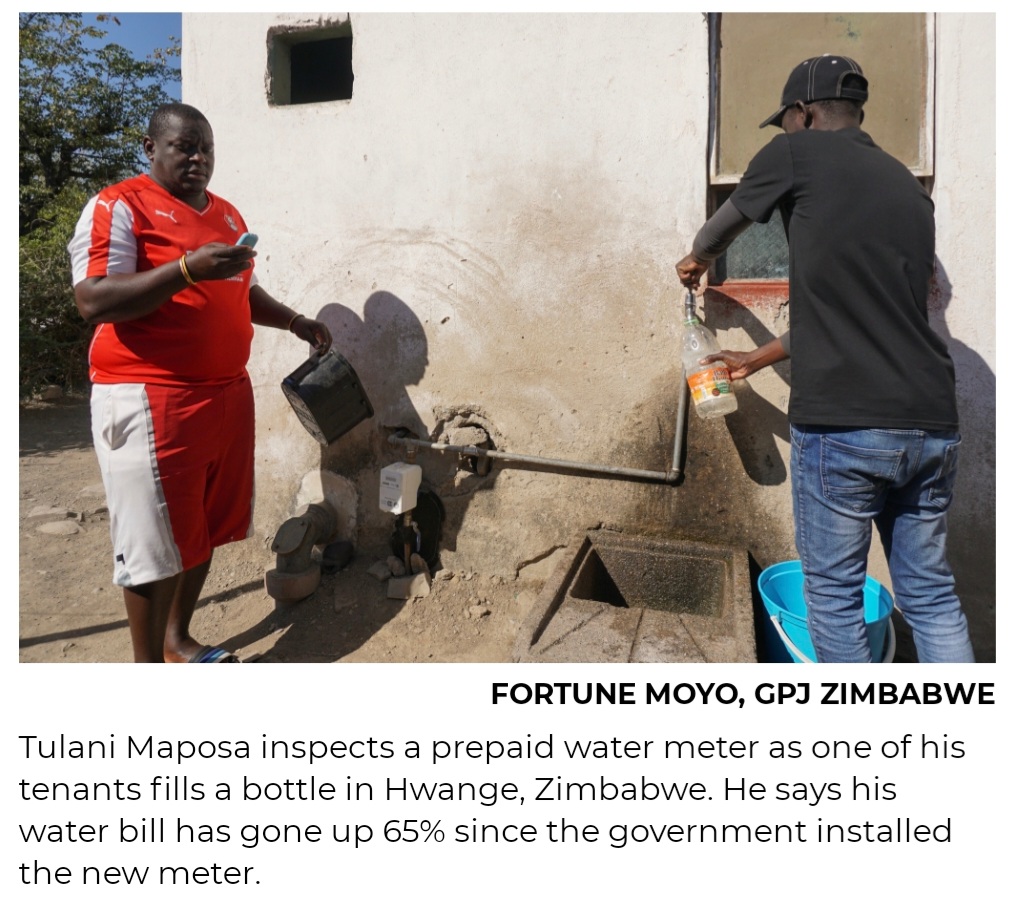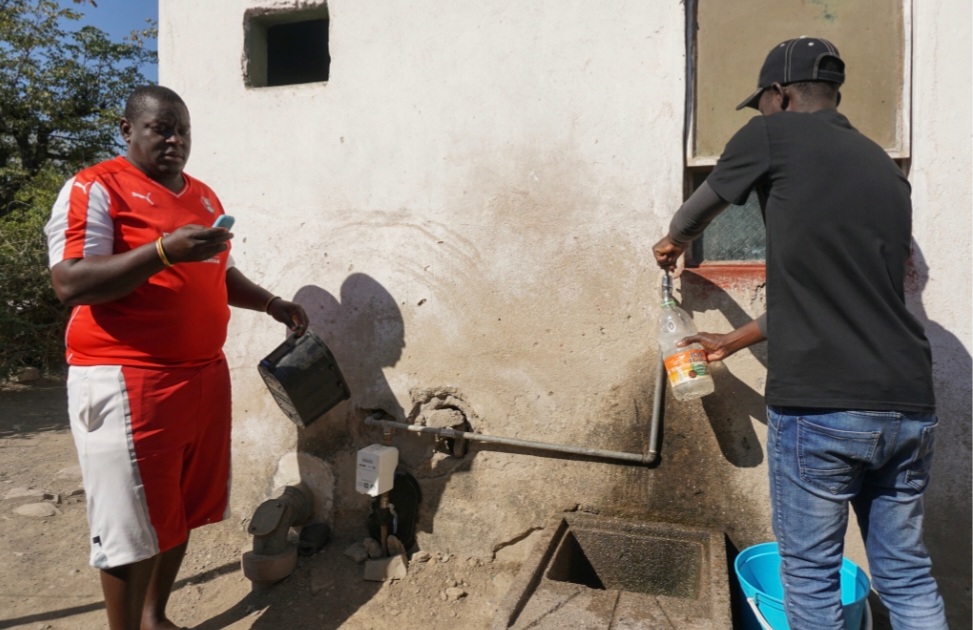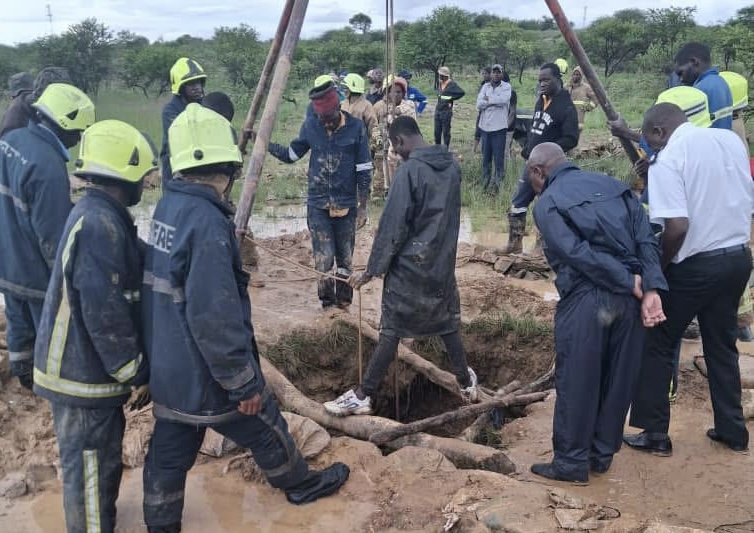BY FORTUNE MOYO
When Dr Tulani Maposa’s tenants wash their dishes or clothes at a tap outside his house, chances are that he’s secretly watching them.
Sometimes when residents take showers, he listens through the walls to make sure they don’t stay in too long.
Keeping a close eye on tenants’ water practices may sound like an invasion of privacy.
But Maposa swears it’s not his choice. “I am forced to monitor how tenants are using water so that it lasts for the month,” says the family man and medical doctor for a local football team.
Maposa owns a three-bedroom house in Empumalanga, a suburb of Hwange, a coal mining town in western Zimbabwe.
He occupies part of the house with his wife and three children, and rents out two bedrooms to two other families.
Maposa and his tenants share common areas like the kitchen and bathrooms.
A new and controversial change in the way residents like Maposa are billed for water has met stiff resistance from consumers and their advocates, who say it hurts those who can’t afford to pay for water in advance.
The Zimbabwe National Water Authority, popularly known as Zinwa began installing new meters last year that require customers to prepay for the water they use.
But landlords like Maposa say the new meters have tremendously increased their bills, forcing them to take drastic, and at times invasive, measures to ensure their tenants don’t waste water.
efore the authority introduced prepaid water meters, residents paid their water bills after usage, at the end of the month.
The new system requires customers to go online and pay for a code that allots them “tokens” of water.
When the tokens run out, the meter automatically shuts off the flow of water until the consumer buys more.
Maposa says his monthly bill, which used to average around 2,000 Zimbabwean dollars (ZWL) ($3.89) before a prepaid meter was installed at his property in March, has shot up 65% to 3,300 ZWL ($6.42) for the 30 cubic meters (almost 8,000 gallons) of water the three households on his property use.
“It is such an unfair system,” he says.
During times of network connectivity failure, which are common and can last up to four days, Maposa says it’s impossible for even people who have money to buy more water when they run out.
He’s concerned that could turn into a health crisis, especially now that people are trying to avoid contracting the coronavirus.

Clifford Nkabinde, who works as a freelance accountant for various organizations, says his water bill has increased nearly 60 percent since April, when the water authority installed a prepaid water meter at the family house in Empumalanga, where he lives with his parents.
“When I don’t get any work for a particular time, life becomes tough,” Nkabinde says.
“My parents are my responsibility; and with the introduction of these meters, life has become more difficult as I also take care of food, electricity, water and other necessities.”
Nongovernmental organizations also accuse the water authority of using the prepaid meters as a way to privatize water, which they say is an infringement on the human right to water.
“Prepaid meters ensure that access to water is only guaranteed to those who can pay,” says Joy Mabenge, national chairperson of the Zimbabwe Coalition on Debt and Development, a social and economic justice organization.
“This is akin to privatization and commodification of water.”
But Marjorie Munyonga, a spokesperson for the water authority, denies that the agency is trying to privatize water.
She says the upgrades to prepaid water meters were necessary because the gadgets are an emerging innovation to help with water resource management.
“It does not in any way limit anyone’s right to water,” she says. “In fact, prepaid meters are giving consumers greater control of their water-use patterns, which was not the case with the old metering system.”
Munyonga denies that the new meters have made water more expensive for consumers, saying the agency uses exactly the same pricing tariffs for the new meters as it did the old.
She says there are new pricing tiers designed to encourage conservation of water, which might explain why some are paying more.
For example, a customer who uses under 10 cubic meters (2,641 gallons) of water is charged 173.59 ZWL ($0.33) for each cubic meter (264 gallons), compared to 300.89 ZWL ($0.59) per cubic meter between 21 and 30, she says.
“The narrative that prepaid water is more expensive is a result of misconceptions emanating from the fact that when the water authority introduced prepaid meters, the postpaid and prepaid systems were integrated in a way that allows clients to pay off their debts wherever they purchase prepaid tokens,” Munyonga says.
Many urban water supply agencies in African countries such as Namibia, Zambia, South Africa, Uganda, Kenya and others have adopted prepaid water meters to improve collection of payments.
Despite the development, controversy surrounds the system as some see it infringing on people’s right to water.
Local residents such as Nomthandazo Masuku say individual cities should create backup water supply systems to kick in when residents run out of water and can’t afford to buy more from the water authority, or when they have no network connectivity.
The mother of two says she and other residents are pushing the Hwange Local Board, the town council, to drill boreholes for residents as an alternative water source.
“When the water token is running low, we are forced to use the bush to relieve ourselves because we need to save water for other uses,” she says.
“It is more difficult when you have children.”
Dumisani Nsingo, the public relations officer for the Hwange Local Board, says the local council is looking into the issue of drilling boreholes in its area of jurisdiction as a contingent measure in the event of water disconnections.
“We included the drilling of eight boreholes at selected areas in our budget this year,” Nsingo says.
Other residents want the water authority to stop installing the new meters and return their old ones. In February, about a month before Maposa’s meter was installed, he and a dozen other residents took the agency to the High Court in Bulawayo.
A judge agreed with the residents that installation of prepaid meters without consent of the consumers was “unlawful, unreasonable and unfair.”
The judge ordered the agency to stop installation of meters, remove those it had already installed, and replace them with the old ones.
But Maposa says the water agency defied the court order and continued to install new prepaid meters, including at his home.
Munyonga, the water agency official, says it would have been impractical to stop the programme because 2,843 prepaid water meters had been installed in Hwange, representing 96 percent of clients.
“The rollout of the meters is going ahead well, not only in Hwange, but in other parts of the country,” Munyonga says.
Justice Alfred Mavedzenge, a constitutional scholar and legal adviser at the Africa Regional Programme of the International Commission of Jurists, says the court order was a temporary relief order, which doesn’t stop the agency from installing prepaid meters.
As long as the matter has not been finalised, it can continue installing the meters, he says.
“Personally, however, I believe it is unlawful for Zinwa to install the prepaid meters without consulting the residents,” Mavedzenge says.
“Maposa and company in the meantime can appeal this interim order.”
But Maposa says he and other residents have no intention to go back to court and ask the judge to force the water agency to obey the order.
Instead, they have decided to request local authorities to engage the agency on their behalf to see how they can come up with a system that works for both parties.
Until then, Maposa says he must continue to monitor his tenants’ use of water.
He doesn’t like to because it’s exhausting and he doesn’t feel good about having to spy on his tenants. He laments his loss of humanity — that sense of care that makes communities share resources — and attributes it to the prepaid meters.
“In the event one has no money to buy water, it is difficult to ask for water from your neighbour because they also buy the water,” Maposa says.
“Before prepaid meters, as neighbours we would share water and at the end of the month, when the bill came, we would split the cost. Now that is not possible.”
So far, Maposa’s tenants don’t seem to mind him monitoring their water use.
As he speaks about how uncomfortable it makes him, one of his tenants walks by and overhears the conversation.
The tenant declines to give his name or to be interviewed at length, but he says he understands why his landlord has to be vigilant.
“It’s tricky,” he says, “but I guess he has to do that so that we are all accountable.” – Global Press Journal
Fortune Moyo is a Global Press Journal reporter based in Victoria Falls, Zimbabwe.


 Slider3 years ago
Slider3 years ago
 National4 years ago
National4 years ago
 Tourism and Environment4 years ago
Tourism and Environment4 years ago
 Opinion4 years ago
Opinion4 years ago
 Special reports4 years ago
Special reports4 years ago
 National4 years ago
National4 years ago
 National3 years ago
National3 years ago
 National3 years ago
National3 years ago



